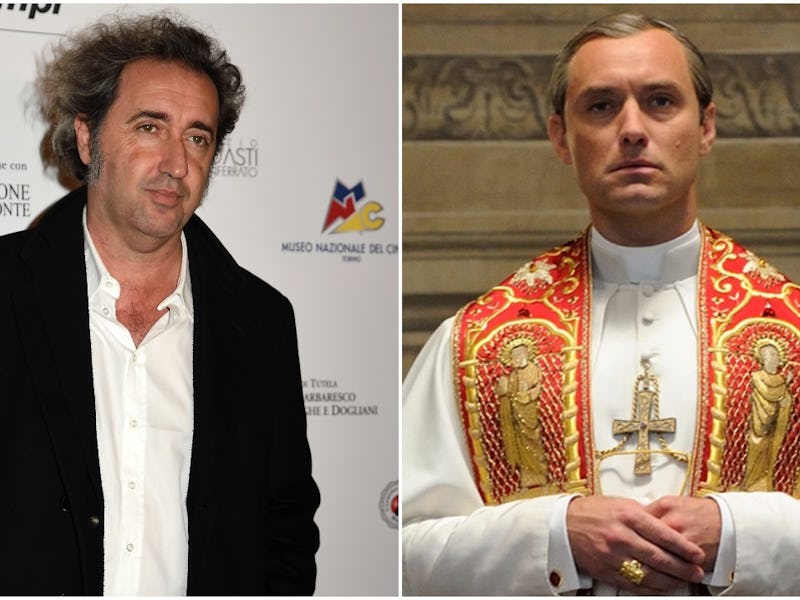Paolo Sorrentino is the Reason 'Young Pope' Will Fuck You Up
How the Italian auteur's previous work explains the absurdity of HBO's newest series.

Rest assured, HBO’s The Young Pope is a real show, and it’s here to absolve us of our sins.
While the run-up to the show was filled with memes lightly mocking its title, the series has been the real deal. The drama focuses on a renegade American pope played by Jude Law (young for pope standards), shaking up the Vatican status quo. Law saunters around Vatican City like a drunken mix between Vito Corleone and the Fonz, smoking cigarettes while ordering Cherry Coke Zero for breakfast; the guy is God’s messenger, and yet he gets dressed in his papal robes to “Sexy and I Know It” by LMFAO. If that sounds good to you, it’s time to get to know more about the gloriously weird filmography of the show’s Oscar-winning creator, Italian filmmaker Paolo Sorrentino.
Sorrentino is a Fellini-esque bard whose previous works focus on excess, and The Young Pope is no different. It’s a melodramatic, magical realist camp. This is a show that begins with Jude Law’s plucky pontiff crawling out of a mountain of dead babies. (Don’t worry, it’s a dream sequence — actually, on second thought, worry.) But underneath all the preposterous imagery is a more contemplative story about the seductiveness of power. Sorrentino said early on that the show is primarily about “the inner struggle between the huge responsibility of the Head of the Catholic Church and the miseries of the simple man that fate (or the Holy Spirit) chose as Pontiff.”
Sorrentino is able to pull it off because he has a lot of experience with that kind of genre balance, as you can see in his Italian filmography.
The Consequences of Love
Can something be a psychological thriller if nothing thrilling happens? The psychological part is the key to this 2004 film, which stars Sorrentino’s longtime collaborator Toni Servillo; the actor plays a mafia pawn cooped up in a Swiss hotel who pines after the hotel bar’s waitress. It’s like the most boring James Bond movie you’ve never seen, told from the stylish perspective of the bad guys trying to beat Bond. Early episodes of The Young Pope are filled with tense exchanges between Law and some poor subordinate who must humor him with feigned pleasantries. The tense stillness of the dynamics of dialogue is something Sorrentino definitely cultivated in The Consequences of Love, where a look, a turn of the head, and the raising of a gun, are all just as threatening as each other.
Il Divo
Probably the film that is the most fundamentally similar to The Young Pope in Sorrentino’s oeuvre is Il Divo — a cartoonish biopic of a scandalous former Italian Prime Minister named Giulio Andreotti (Servillo). The movie uses a sensory overload technique to suggest that anything that happens to larger than life figures in power isn’t stranger than fiction. The film risks losing most audiences who aren’t up on the scandals of post-World War II Italian government, but Sorrentino’s point about how any similar social structure — like, say, the papacy — has the opportunity to be nothing more than a devious backstabbing circus is not lost.
This Must Be the Place
Sorrentino’s first English-language film remains his most resolutely off-kilter, which says a lot. Like The Young Pope, it’s tough to get beyond its mere premise without cracking a wry smile and asking if he’s for real. The movie stars Sean Penn as Cheyenne, a jaded former rock star slathered in Kabuki-esque makeup, a la Robert Smith from The Cure, who reemerges from a self-imposed exile in Dublin. His mission: Become a Nazi hunter following the death of his Holocaust survivor father. Move past the ridiculous plot and legitimately touching David Lynch-like themes about transformation and catharsis emerge.
The Great Beauty
Sorrentino’s 2013 Oscar-winner for Best Foreign Language Film is like his own contemporary version of La Dolce Vita. The meandering treatise on how far Italy has fallen since the particularly memorable fall of the Roman Empire shares certain obvious DNA with The Young Pope. Both have uniquely Italian takes on particular classes of people who remain complacent amid a once-important entity’s gradual decline. In The Great Beauty’s case, it’s aging socialite writer and layabout protagonist Jep Gambardella (Servillo) who is jolted out of his passive lifestyle to come to terms with his own obsolescence in contemporary Rome. Law’s Pope Pius XIII is the jolting force trying to disrupt people like Jep.